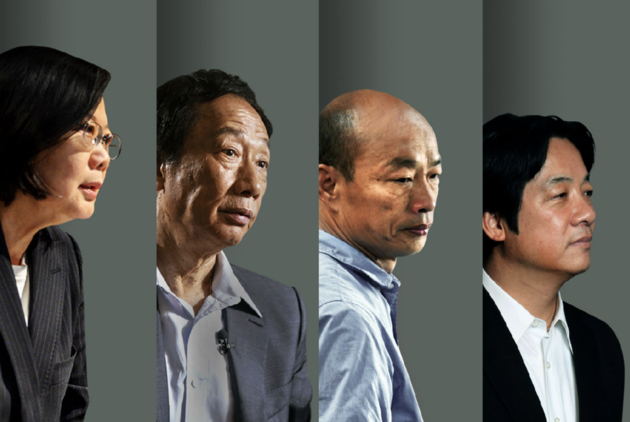2020 Presidential Election: A Battle Between Anti-unification and Unification

Source:CW
Taiwan’s opposition Chinese Nationalist Party (KMT) on Monday announced Kaohsiung mayor Han Kuo-yu as the winner of its 2020 presidential primary. The result means that Han will be running against President Tsai Ing-wen (蔡英文) as she seeks a second term in next January’s presidential election.
Views
2020 Presidential Election: A Battle Between Anti-unification and Unification
By William Yang/Ketagalan Mediaweb only
After conducting a week-long nationwide poll through landline-based phones, Taiwan’s opposition Chinese Nationalist Party (KMT) on Monday announced Kaohsiung mayor Han Kuo-yu (韓國瑜) as the winner of its 2020 presidential primary, with Foxconn founder and billionaire Terry Gou (郭台銘) defeated by a 17% margin of victory.
The result means that Han will be running against President Tsai Ing-wen (蔡英文) as she seeks a second term in next January’s presidential election.
Many experts view the primary outcome as a confirmation that voters who supported Han Kuo-yu in last November’s local election—in which he shockingly won the Kaohsiung mayoral race, ending decades of Democratic Progressive Party (DPP) dominance in the city—still pick him as their favored presidential candidate.
Almond Meng, a professor in political science at Tainan’s National Cheng Kung University, points out that most of Han’s supporters are lower-middle class or working class voters, and most of them care about fair economic distribution. “The KMT’s primary result shows that many of Han’s supporters have been backing him up since last November’s election,” Meng explains.
Lev Nachman, a Fulbright scholar studying political parties emerging from social movements in Taiwan, thinks that Han winning the primary by a large margin reflects that deep blue voters have more strongly favored Han since the primary race began.
“The primary result shows that electorally, Han’s ‘wave’ is mobilizable,” Nachman says. “This means that even when his polling may fall during off-election time, when it’s time to vote, Han’s supporters will show up.”
Chen Fang-yu, a PhD candidate at Michigan State University, thinks that although Han’s popularity had declined in nationwide opinion polls, he remained the strongest candidate the KMT had to offer, as his convincing win in the primary showed that none of the other candidates could match his level of popularity.
Chen explains that the campaign strategy of Terry Gou, who some have speculated could launch an independent bid to challenge Han, has serious flaws which hurt him in his battle against Han. “Gou spent a lot of money on advertising, but his attempt to transform his public image is a failure,” Chen says.
“He wants to create a very down-to-earth public image, but that’s too different from the public image that Taiwanese people have about him. His poor public speaking skills also contribute to his ultimate failure to win the primary.” (Read: Who Are Han Kuo-yu’s Hardcore Fans?)
How Likely is Ko Wen-Je’s Entry into The Race?
Even though both the DPP and KMT have wrapped up their presidential primaries, many people are still waiting to see if other high profile political figures will join the election as independent candidates. One of them is Taipei Mayor Ko Wen-je (柯文哲).
Professor Meng thinks, should the independent mayor enter the race, Tsai Ing-wen would have a better chance of winning the election than if she were to only run against Han.
“Since Han’s supporters overlap with traditional DPP supporters, as long as Tsai can continue her anti-unification campaign, she might be able to attract some lower middle class and working class votes from Han,” Meng explains. “As it remains hard for Han to appeal to the younger generation and highly educated voters, Tsai can likely secure these voters’ support, giving her a higher chance of winning the election.”
Other experts think Ko’s possible contention keeps the election outcome highly unpredictable. Based on the current polling, Chen Fang-yu thinks that Ko’s intention to join the presidential election may not necessarily be to win, but rather to disrupt the election. “It is possible that Ko or other politicians might join the election, but their main goal would likely be complicating the election result or appealing to middle-ground voters,” he says.
Nachman points out that since Ko has been gradually leaning towards the pan-Blue (KMT-allied) camp in recent weeks, Ko, Gou and Han could all fight for KMT votes should they all contest the presidential election next January—making the situation potentially ideal for Tsai to be re-elected. However, if Han’s support base remains stable, it might also be hard for independent candidates to take away too many votes from him.
“There is also the possibility that Ko’s contention could weaken Tsai’s support base,” Nachman explains. “Based on [the] KMT’s primary result, I think Gou will seriously consider whether he should still run for president as an independent candidate or not.”
Is 2020 A Battle Between Unification and Independence?
Like most of Taiwan’s past presidential elections, experts think cross-strait issues remain the dominant factor set to impact the election result.
However, since the DPP continues to campaign on the promise of defending Taiwan’s sovereignty, Chen thinks the 2020 presidential race will be a battle between the anti-unification camp and forces favoring unification with China.
Nachman thinks that, unlike past elections, the DPP will try to use the ongoing anti-extradition bill movement in Hong Kong to frame its cross-strait arguments, since it plays into Tsai’s strengths while exposing Han’s weaknesses.
“We know from political science data that cross-strait relations are the most salient issue during presidential elections in Taiwan and this year will be no different,” Nachman says. “Apart from the typical trade with China talking point, I think the ongoing protests in Hong Kong will change how we talk about cross-strait relations.”
Haver you read?
♦ Taiwan President Issues Statement Regarding Hong Kong Protest
♦ Han Kuo-yu's Visit to Hong Kong Raises Suspicions
♦ Terry Gou Moves Production Lines to Kaohsiung

Ketagalan Media is a team of entrepreneurial journalists and creatives dedicated to building the gateway for ideas and trends connecting Taiwan, Asia and the world. Original content can be found at the website of Ketagalan Media: 2020 Presidential Election: A Battle Between Anti-unification and Unification
This article is reproduced under the permission of Ketagalan Media. It presents the opinion or perspective of the original author / organization, which does not represent the standpoint of CommonWealth magazine.










